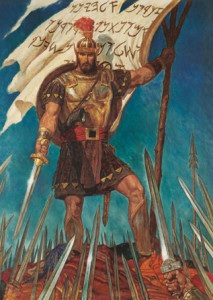Wives and Children
August 15th, 2024 by G.
The Books of Mosiah and Alma are this time of great cultural ferment that I’m calling Nephite Modernity.

Something odd I’ve just noticed. The phrase “wives and children,” “our wives and our children,” “their wives and their children,” shows up 20 times in the Book of Mormon. 16 of those times are in Mosiah and Alma. 1 is in Mormon, 1 in is 3 Nephi, and 2 are in Ether.
You: What does it mean, G?
G: I don’t know what it means, you.
It does reinforce the idea that the Mosiah-Alma era is a distinct era. It also makes me wonder if the translation of the Book of Ether is responsible for this phrase taking off with the Nephites.
John Mansfield
August 15, 2024
It’s an interesting thing how Mormon regards the end of Nephite civilization in his day as rooted in and a fulfillment of the Mosiah-Alma developments. In his compilation the hundreds of years between Jacob and Benjamin are hazy with the main point being that Nephi’s records were passed on. The hundreds of years after Christ, even Mormon’s own time, are a blur that mainly serve to say, “See: prophecy fulfilled.”
Jacob G.
August 15, 2024
Another possibility is that it comes from the Mulekites. If the phrase occurs in early Mosiah that would give that theory a little more weight.
G.
August 15, 2024
The earliest refernce in Mosiah in in Chapter 19.
however, I re-ran the search and got different results than last time (i am not a fan of the Church’s search, it used to be much better).
I now found 22 references, 17 are in Mosiah and Alma, but the earliest reference is in Jacob 2. Then Mosiah 19.